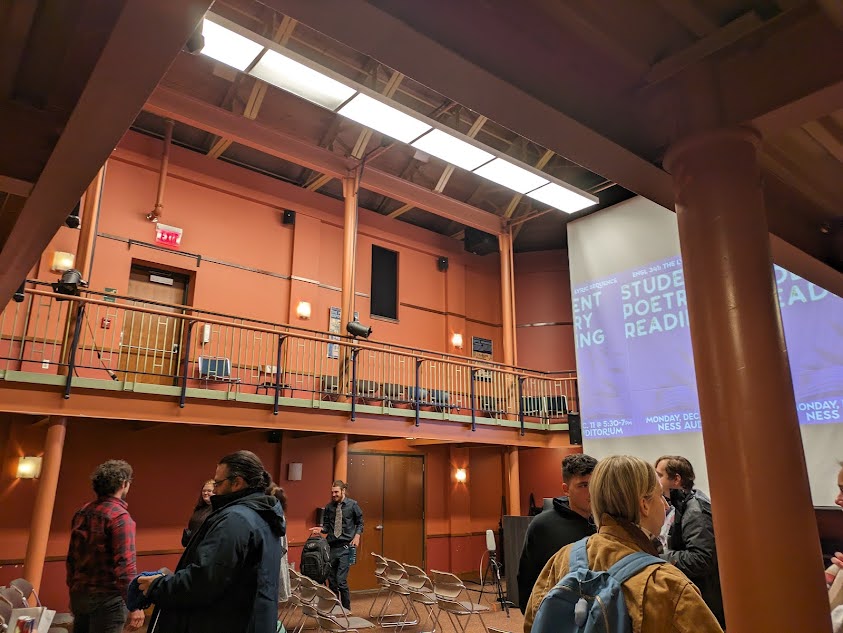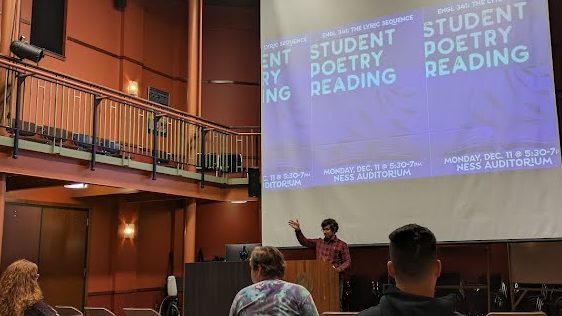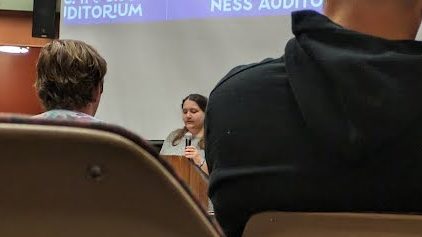
Photo by R. E. Johnson. Students congratulate each other after the poetry reading.
Students from Dr. Marlo Starr’s Lyric Sequence class presented poems from their micro chapbooks in Ness Auditorium at the close of last semester. The assignment was to create connected poems in various styles. Regular chapbooks contain around 20-40 pages, the “micro” version is only ten pages.
While Dr. Starr was unable to attend in person, she listened in via Teams and gave us advice from the heavenly loudspeakers in Ness Auditorium. Professor Andy Graff subbed in as overseer of the room while student and Writer’s Club president Jake Moore was MC.

“I was blown away. I didn’t think it could keep getting better, but BOOM, it did!” Graff said.
Madalene Deichman read first from her collection “Faunt of Grief.” Her individual poems portray life on the edge of a suburban Michigan family. “Grief is a Bastard” personifies grief as a violent, feral, house guest while the speaker comes to terms with a recent death. The closing poem, “I am History” gives hope to “black sheep,” whose place takes the form of historian over the family history.
Next, Myia Smith brought tears to the audience while reading “Out of My Mind.” The series of poems weaves together the dynamics of an abusive household and the subsequent mental effects of abuse on children. “The Middle Children” elaborates on the speaker’s role as the middle child, growing up too fast to care for the family whilst masking their suffering. Smith describes these children as having “zipped mouths, and tired eyes.”
The poem to truly hit the hearts of the audience was “Dial,” a short but sweet love poem to a sister. Smith ended the poem looking into the eyes of her sister, Kaulana Smith, saying “don’t call my mom, call my sister.” After the applause, the Smith sisters embraced.

“I just can’t get over it, I’m still crying,” Kaulana Smith said after the readings had finished.
Jake Moore, taking a step down from host duties, followed up with fantastical interpretations of mundane life. “Love of a Dragon” follows a brave knight as he works to bring comfort and aide to an elderly “dragon.” The last poem, “Skipping Rocks: A Guide to Disremembering” explains these fantasies help us enjoy the “storm clouds” and cope with the harder parts of life. Moore hopes that the poems will “serve as great bedtime stories for his family and friends,” specifically, his niece.
Geology major Jaedan Sarragua unites nature and poetry in “Northbound.” He reflects on the landscapes that have followed him through life. “Earth’s Greatest Movements” is a modern sonnet that sings praises to the “eternal sentinels” and “vast geologies” of the Appalachian Mountains from his childhood. The closing poem refers to the local Ferncliff Cemetery and its autumnal foliage as an analogy for moving on. The leaves in the graveyard are seasonal tombstones of nature, and what we leave behind as we grow. Like our memories, the leaves are “gone but not forgotten.”

Closing the reading was the article’s author, who presented “Descendants of Disability,” a collection of poems about the stigma of disability. Starting with “Ode to the Addict Who Broke into My Garage,” where the speaker realizes the false narrative around addiction. This expands into anger at diagnosis in ”Abecedarian on the Alacrity of Acronymic Assignment” where each new stanza spells out the acronyms of their diagnosed disorders. Ending with a mic drop, the accusatory poem ‘The Untitled” is a flow-of-mind freeform of internal rhymes and spite around the continued lack of disability services.
As each student approaches a new semester, we can take a lesson from the overarching themes of the program. While life is ever-changing, for good or bad, we are part of that change. Together, we can conquer anything.





